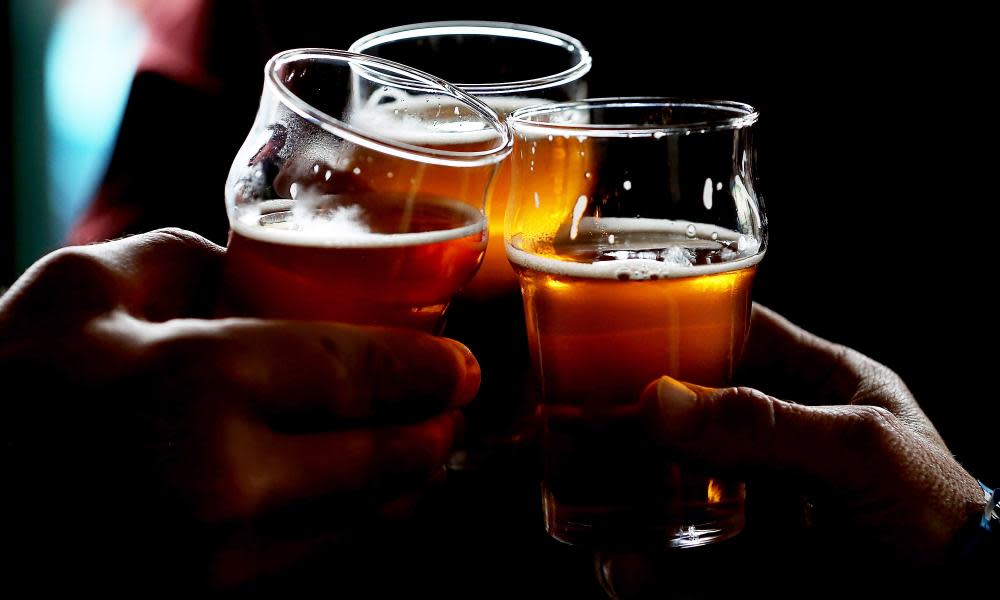Is it time to tackle Britain’s alcohol problem? | Letters

Your article (Doctors warn of soaring UK alcohol deaths, 24 July) did not refer to an important element in the question of “soaring alcohol deaths” – alcoholism.
This disease is the silent destroyer of thousands of lives, families and careers. It is a terrible, all-consuming illness, not just a tramp lying drunk on a park bench. The medical profession is remarkably ill-informed about alcoholism, and very few hospital and GP doctors recognise the signs. This means alcoholics who reach a crisis and seek medical help are seldom directed to the treatment they need, or to the sterling help of Alcoholics Anonymous. They are usually given antidepressants – a very poor mixer with alcohol.
You missed a perfect opportunity to bring this elephant out of the room and into the public eye, and name it. Please shame the government into acknowledging that the NHS is not informed or equipped to deal with this illness so it can encourage sufferers to speak out and get help. Can this be because governments gather such enormous revenues from alcohol sales that they are reluctant to make any attempt to control its consumption?
Fiona McGarel-Groves
Wooburn Moor, Buckinghamshire
• Cheap booze kills thousands, if it is easy to access and abundant. Advanced liver disease is painful and emotionally harrowing: definitely not a “good death”. Violence (especially towards children and their mothers) and accidents (especially at work or in traffic) are more likely if levels of alcohol in the blood are high. Alcohol plays a major role in British suicides (and murders) which are on the increase.
None of these are inevitable. Within living memory the popular drinks were weaker than today’s, one unit of alcohol was more costly as a proportion of household income, and there were no retail outlets open 24/7. Gradually, transnational corporations producing insidiously stronger drinks, combined with clever marketing through multiple channels (including social media) fooled politicians into backing cheap booze for all. Sometimes they even used the same argument as makers of hi-tech bombs: government must support us, to secure big export markets! Let’s not bomb our own people any more.
Woody Caan
Special Interest Group for Alcohol, Faculty of Public Health
• Once again the Guardian is guilty of uncritically repeating claims by the anti-alcohol fanatics. Three facts that your story on alcohol-related liver disease should have included but did not: (1) There was a 7% fall in chronic liver disease in the UK between 2006 and 2014; (2) The UK ranks 119th in the world for deaths from liver disease; (3) People who live in the most deprived areas of the UK, such as the north-east of England and Liverpool, are more likely to die of liver disease than those in the least deprived areas. Liver disease is a disease of poverty, primarily, and restricting alcohol will not alter that.
Martyn Cornell
Teddington, Middlesex
• It’s not just the pricing of alcohol that is the problem. The industrial- to weapons-grade strength of drinks on sale in pubs is both worrying and confusing. On a recent visit to the West Country, several pubs offered no choice of lagers much below 5% ABV. When, in the absence of labelling, bar staff were quizzed, they provided vague estimates and mild annoyance when asked to provide accurate information. As for cider, at least the barman of one pub was honest in professing his ignorance – warning that the tipple started somewhere between 6% and 8% ABV but, upon tapping the barrel, it continued to ferment in an upward direction until it ran dry. There used to be a tradition of weaker so-called “session beers” at a more responsible 3%-plus. Surely the promotion of potable but less potent pints would represent a welcome range of options.
Austen Lynch
Garstang, Lancashire
• The BMA has repeatedly called for the introduction of minimum unit pricing across the UK – a call that is all the more urgent as 35 people a day in England are expected to die from alcohol misuse in the next five years.
Minimum unit pricing in Canada has already seen a significant reduction in wholly alcohol-related deaths. Time and again in the UK, it has been decisive (if overdue) action by successive governments, such as the public smoking ban, that has had more impact than a single doctor can have in a lifetime.
While minimum pricing alone won’t solve all alcohol misuse problems, combined with work on education, marketing and the availability of alcohol, it will play a key role in reducing alcohol-related harm and the financial burden this places on an already overstretched NHS.
Professor Parveen Kumar
Board of science chair, British Medical Association
• When looking at the full costings around this issue, the profits generated from alcohol sales need to be included with a view to implementing a hypothecated alcohol tax. The cost to the NHS should be laid at the door of this industry, pure and simple; polluter pays. Only then will they take responsible drinking seriously.
Cllr Vaughan Thomas
Labour, Norwich city council
• I don’t suppose the government inaction over alcohol consumption has anything to do with the alcohol industry donations to the Conservative party?
Jake Fagg
Bristol
• Join the debate – email guardian.letters@theguardian.com
• Read more Guardian letters – click here to visit gu.com/letters

 Yahoo News
Yahoo News 
